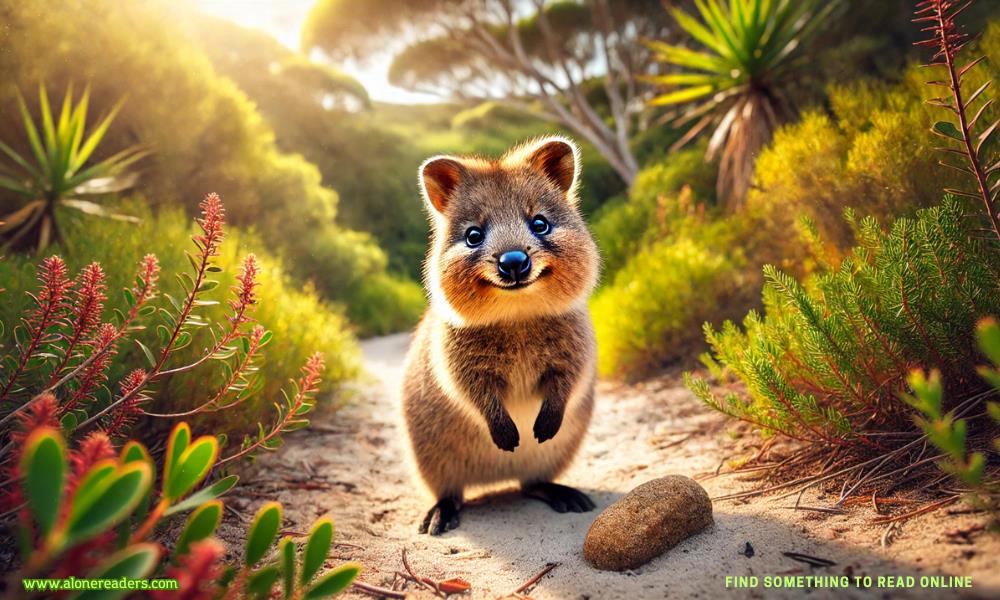
The quokka, a small marsupial native to Australia, has earned the affectionate title of the happiest animal in the world. With its perpetual smile and friendly demeanor, the quokka has captured the hearts of people around the globe. These charming creatures inhabit the southwestern regions of Australia, primarily on Rottnest Island and a few mainland locations. Their endearing appearance, combined with their approachable nature, makes them a favorite among both locals and tourists.
Quokkas are members of the macropod family, which includes kangaroos and wallabies. They are about the size of a domestic cat, standing roughly 40 centimeters tall and weighing between 2.5 to 5 kilograms. Their small stature and round bodies contribute to their cute and approachable appearance. The quokka's fur is typically a soft brown or grey, with a lighter underbelly. Their facial structure is distinct, featuring a broad face, large eyes, and a small, rounded nose that gives them their signature "smile."
One of the most fascinating aspects of quokkas is their social behavior. They are nocturnal animals, primarily active during the night when they forage for food. Their diet consists mainly of grasses, leaves, and stems, but they are also known to eat fruits and bark. Quokkas have a unique ability to survive with minimal water, obtaining most of the moisture they need from their food. This adaptation is particularly beneficial in the arid environments where they live.
Quokkas are generally solitary creatures, but they can sometimes be found in small groups, especially when resources like food and water are abundant. Their interactions with humans have also been a significant factor in their popularity. Quokkas are naturally curious and tend to approach humans without fear, which has made them a favorite subject for selfies and social media posts. Their seemingly smiling faces have contributed to their reputation as the happiest animals, symbolizing joy and positivity.
The primary habitat of quokkas is Rottnest Island, a picturesque island off the coast of Western Australia. The island provides an ideal environment for quokkas, with its abundant vegetation and lack of natural predators. On the mainland, quokkas are found in small, isolated populations in places like the southern parts of Western Australia. Conservation efforts have been crucial in maintaining these populations, as quokkas face threats from habitat loss, introduced predators like foxes and cats, and human interference.
Conservation programs on Rottnest Island have been particularly effective in protecting quokka populations. Strict regulations limit human activities that could disrupt their natural behavior, and ongoing efforts focus on habitat restoration and predator control. These measures have helped stabilize quokka numbers on the island, ensuring that future generations can continue to enjoy the presence of these delightful animals.
Despite their cheerful appearance, quokkas are not without challenges. Climate change poses a significant threat to their habitat, with increasing temperatures and changing rainfall patterns affecting the availability of food and water. Additionally, the popularity of quokkas on social media has led to concerns about overexposure and human impact on their natural behavior. To address these issues, guidelines have been established to promote responsible tourism and minimize disturbance to quokka populations.
Quokkas have also become a symbol of Australian wildlife conservation. Their popularity has raised awareness about the importance of protecting native species and their habitats. Educational programs and wildlife tours on Rottnest Island emphasize the need for sustainable practices to ensure that quokkas and other native animals thrive in their natural environments. By fostering a sense of responsibility among visitors, these initiatives help preserve the delicate balance of the ecosystem that quokkas depend on.
In addition to their ecological significance, quokkas hold cultural importance for the indigenous people of Australia. The Noongar people, traditional custodians of the land where quokkas are found, have long respected these animals as part of their heritage. Stories and traditions involving quokkas are passed down through generations, highlighting the deep connection between the indigenous communities and the native wildlife. This cultural perspective adds another layer of meaning to the conservation efforts aimed at protecting quokkas.
Research on quokkas has provided valuable insights into marsupial biology and behavior. Studies have focused on their reproductive habits, social structures, and adaptability to changing environments. Quokkas have a unique reproductive cycle, with females capable of pausing the development of embryos in response to environmental conditions. This adaptability enhances their chances of survival in fluctuating habitats, making them a subject of interest for scientists studying resilience in wildlife.
Quokkas also play a role in the broader ecosystem as seed dispersers. By consuming fruits and other plant materials, they help in the propagation of various plant species, contributing to the health and diversity of their habitat. This ecological function underscores the interconnectedness of species within an ecosystem and the importance of each organism in maintaining environmental balance.
The charming appearance and friendly nature of quokkas have made them ambassadors for Australian wildlife tourism. Visitors to Rottnest Island often engage in eco-friendly activities that allow them to observe quokkas in their natural habitat without causing harm or disturbance. Photography, guided tours, and educational workshops are popular ways for people to connect with these animals while promoting conservation awareness.
Quokkas have also inspired art, literature, and media, further cementing their status as beloved creatures. From paintings and sculptures to children's books and viral internet memes, the quokka's image is widely recognized and celebrated. This cultural representation helps to spread positive messages about wildlife conservation and the beauty of Australia's unique fauna.
In conclusion, the quokka's title as the happiest animal in the world is well-deserved, given their joyful appearance and engaging behavior. These small marsupials not only bring joy to those who encounter them but also play a crucial role in their ecosystems and cultural landscapes. Ongoing conservation efforts are essential to ensure that quokkas continue to thrive in their natural habitats, allowing future generations to experience the happiness and charm that these remarkable animals embody.